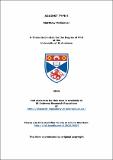Files in this item
Against type E
Item metadata
| dc.contributor.advisor | Cappelen, Herman | |
| dc.contributor.author | McKeever, Matthew | |
| dc.coverage.spatial | ix, 135 p. | en_US |
| dc.date.accessioned | 2016-11-29T08:45:18Z | |
| dc.date.available | 2016-11-29T08:45:18Z | |
| dc.date.issued | 2016-12-01 | |
| dc.identifier.uri | https://hdl.handle.net/10023/9895 | |
| dc.description.abstract | It’s generally assumed that a compositional semantic theory will have to recognise a semantic category of expressions which serve simply to pick out some one object: e-type expressions. Kripke’s views about names (Kripke, 1980), Kaplan’s about indexicals and demonstratives (Kaplan, 1989), the standard Tarskian semantics for bound variables (Tarski, 1956), Heim and Kratzer’s Strawsonian view about definites (Heim and Kratzer, 1998), even an (admittedly somewhat unpopular) analysis of indefinites (namely Fodor and Sag, 1982), assume as much. In this thesis, I argue that recent advances in the semantics of names and of quotation, and in metaphysics, give good reason to doubt there is such a category. I do so in two parts. In the first part, comprising about two thirds of the thesis, I combine two recent views, one from semantics and one from metaphysics. From semantics, I take over predicativism about names, the view, as one might have guessed, that names are predicates. From metaphysics, I take over the doctrine that there are temporal parts. Putting them together, I hold that the semantic contribution of the name ’Joan’, in a sentence like ’Joan is a barrister’, is a predicate, and in particular (and somewhat roughly) a predicate the extension of which is Joan’s temporal parts. Names are not, as is commonly thought, e-type expressions. In the second part, building on the first, I further undermine the existence of a semantically important category of e-type expressions by arguing that a construction which might be thought to mandate such a category, namely de re attitude ascriptions, in fact, when properly analysed, does not do so. I argue this by considering the nature of transparent occurrences of expressions in opaque contexts in general, and in particular by considering the phenomenon of mixed quotation. I present a new theory of it, and show how it can be parlayed into a new Fregean theory of de re attitude ascriptions. The thesis overall, then, will provide strong evidence against the semantic importance of e-type expressions either in language, or in (our reporting of) thought. | en_US |
| dc.language.iso | en | en_US |
| dc.publisher | University of St Andrews | |
| dc.subject | Reference | en_US |
| dc.subject | Semantics | en_US |
| dc.subject | Metaphysics | en_US |
| dc.subject | Names | en_US |
| dc.subject | Quotation | en_US |
| dc.subject.lcc | B820.M6 | |
| dc.subject.lcsh | Semantics | en |
| dc.subject.lcsh | Metaphysics | en |
| dc.subject.lcsh | Names | en |
| dc.title | Against type E | en_US |
| dc.type | Thesis | en_US |
| dc.contributor.sponsor | Arts and Humanities Research Council (AHRC) | en_US |
| dc.contributor.sponsor | Royal Institute of Philosophy | en_US |
| dc.type.qualificationlevel | Doctoral | en_US |
| dc.type.qualificationname | PhD Doctor of Philosophy | en_US |
| dc.publisher.institution | The University of St Andrews | en_US |
This item appears in the following Collection(s)
Items in the St Andrews Research Repository are protected by copyright, with all rights reserved, unless otherwise indicated.

